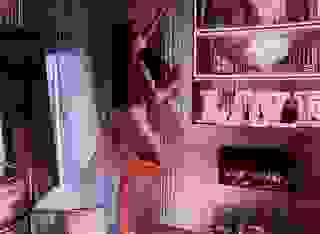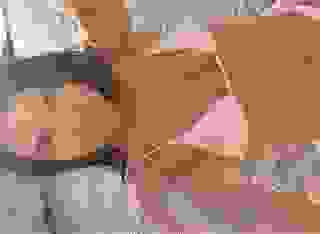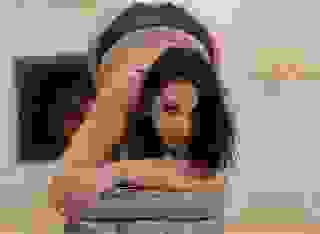- Romance
- A Dime on a Headstone
Note: You can change font size, font face, and turn on dark mode by clicking the "A" icon tab in the Story Info Box.
You can temporarily switch back to a Classic Literotica® experience during our ongoing public Beta testing. Please consider leaving feedback on issues you experience or suggest improvements.
Click hereOne of the things that is a sad commentary on our society is what often happens when a cop gets killed in the line of duty. It makes the news for maybe one day and then gets replaced by a story about how this actress wore a skimpy bikini on some beach and other people complained that she was showing too much of her ass cheeks. It doesn't get reported again until the killer is caught, and usually that's so far down in the news people never see it. Good cops deserve better, especially if they're cops like Donnie Richards.
Donnie Richards was only twenty-two when he applied at the Metro Police Academy right out of the Marine Corp Military Police. He got accepted and went through twenty-six weeks of training, and after graduating spent another six months with a training officer before he was put on the street by himself. He'd been in a patrol car for a little over two years.
I'd worked several cases with Donnie, and I'd learned he was a smart guy with a real head for police work. He wasn't stupid and he went out of his way to be professional with anybody he stopped. He could be tough when he had to be, but always began a stop by being polite and respectful.
By the end of his first year on the force we'd become friends. That's how I knew Donnie was studying hard for the detective's exam. I had no doubt that he'd make it and probably sooner in his career than I had. He'd already earned two commendations.
Our relationship was also special because of his dad, Don Richards Sr., the officer who trained me after I got out of the academy. Don retired right after that, but I'd often call him just to see how he was doing. I owed Don a lot for teaching me the realities of police work.
My supervisor knew of my relationship with Donnie and Don Sr., and that's why I was standing at Don Sr.'s front door with the department Chaplain at nine that Monday morning.
What had happened was Donnie got a call to checkout a silent alarm at a liquor store at one on a Monday morning in July. At two that same morning, the Captain called me to tell me Donnie had been killed and that he had appointed me as liaison officer to the family. That meant I had to notify the family and be the official department assistant to them until they didn't need me anymore. I was to call him as soon as I'd made the notification so he could release the details of the story to the press.
As soon as the Captain told me about Donnie, I told him I wanted the case. At first he didn't like the idea since I was pretty close to Donnie and his dad, but after I threatened to do it on my own, he relented and told me that Jack Macey, another detective, was already at the scene, and we'd work together.
The Captain didn't have much, just the information the backup officer and the EMT's had radioed in. The only things I knew for sure was that Donnie was dead and where and how he died. What the EMT's found was Donnie had been shot once in the right arm, four times in the chest, and once in the forehead. His vest stopped the four rounds to his chest. He'd have had a sore chest for a month or so, but the wound to his right arm hadn't hit anything vital. He'd have lived if it hadn't been for the shot to his head. That made the shot to his forehead look like an execution. I drove over to the liquor store to see if Jack had gotten anything more because I knew Don would want to know as much as I knew.
Donnie's backup had cordoned off the area and the coroner had already taken Donnie's body. Jack was inside with the Crime Lab techs. Jack was as upset as I was.
"Donnie was a good cop, but he didn't have a chance. The motherfucker who shot him had no intention of just getting away. He wanted to kill a cop. I'll show you his dash and body cam videos and you'll see what I mean."
Donnie's dash cam showed that Donnie did everything right. He pulled into the back lot of the liquor store so his dash cam was watching the back door that had been broken open, turned on his alley lights and then his body cam, and called Dispatch for backup. Then he pulled his service pistol and went to investigate.
Twenty seconds after Donnie entered the building, his body cam recorded a guy jumping up from behind the counter, pointing a pistol at Donnie, and firing one shot. Donnie had maybe a second to react but he wasn't fast enough.
That first shot hit Donnie and he went down before he could return fire. What his body cam recorded after that was a pair of legs walking over him and and the sounds of four more shots, then a pause, and then another shot. Seven seconds after the first shot, Donnie's body cam recorded the legs walking away.
The dash cam on his cruiser recorded the guy stepping through the smashed door of the liquor store and then running away, but the part of the video where he was visible was only three seconds long and since the guy was wearing a black hoodie, I couldn't make out his face.
Two minutes later, Donnie's dash cam recorded another officer going into the liquor store with his service pistol drawn. That was the backup Donnie had radioed for. About ten seconds after that, the officer radioed Dispatch to send another unit, a detective, and the EMT's.
It was like Jack said. The guy wanted to kill a cop.
We both figured the first shot that hit Donnie was in his right arm. Since Donnie was right handed, he probably couldn't have done much until he'd switched hands with his firearm and that would have taken him a few seconds at least. After the guy hit Donnie the first time, he could have just run out of the liquor store. Instead, he intentionally walked up to Donnie and put four rounds in his chest.
Evidently he figured out Donnie had on a vest then. On the body cam video, I could hear Donnie moaning after those four shots. The guy then took the time to aim and put a round into Donnie's forehead. All those shots and especially the last one told me the guy had a real thing about cops. Only rage could make him shoot Donnie that many times when he was already down and essentially helpless.
We went back inside then, and Jack pointed out two video cameras in the ceiling.
"I notified the owner and he's on his way. Once he gets here, maybe we can see more on that video. I hope to hell so, because I couldn't make out the guy's face on either video."
The Crime Lab techs were finishing up when the owner got there. He took us back to his office and played the video from both security cameras.
One camera was watching the length of the store including the back door, so we got video of the guy breaking the glass with a crowbar and then coming inside. The second camera was watching the cash register, and had video of the guy trying to break into the register. By beating the hell out of it with his crowbar, he finally got the cash drawer open, but there was no cash. The owner said he'd put all the cash in his safe when he closed up Saturday night at eleven.
The guy roamed up and down the aisles a couple of times without taking anything before the video showed the alley lights of Donnie's patrol car coming through the broken door. When that happened, the guy ran back to the counter, pulled his pistol, and then crouched down and hid. The video showed Donnie was about six feet from the counter when the guy jumped up and took a shot at him. He then walked up to where Donnie lay on the floor on his back and trying to reach his pistol with his left hand.
It took the guy three seconds by the timestamp on the video to get to Donnie, two seconds for the next four shots, then a second where he was aiming, and then the final, fatal shot.
It was obvious to me that the guy knew about both cameras. He had his hoodie up and his head was down all the time he was inside the liquor store. The asshole had been in that liquor store before and knew where the cameras were.
Jack and I took all the videos back to the station and watched them again on a bigger screen, but we still couldn't get a clear enough picture to identify the guy. All we could really tell was he was white, and that was only because the black gloves he wore didn't come up to his shirtsleeves. There was a band of skin visible between his shirt cuffs and the gloves.
The gloves probably meant the Crime Lab techs hadn't gotten any prints, though I knew they'd have dusted every inch of the counter and back door. It was possible the guy had left DNA from that bare skin somewhere, but without blood or something to show the techs where to look, that was a long shot.
We could tell the gun was some type of semi-auto, but it was blued and blended into the black of the guy's hoodie and gloves, so identification was impossible. It was also only visible for a couple of seconds on any of the videos.
The only thing we knew for sure was the cartridge casings the guy left on the floor were from a nine-mil semi-auto. That wasn't much of a start though. The most popular handgun cartridge in the US is the 9x19 parabellum. Without a gun to compare the casings and bullets to, they weren't of much use unless the guy had left his fingerprints on the casings.
We'd have to wait for that information because, unlike on all the crime shows on TV, crime labs don't just turn over everything they're looking at in a few hours. Sometimes it takes days, weeks or even months because of backlogs from other cases and a shortage of personnel and equipment, and the techs are trying to do the best job they can so they follow a strict protocol and they're very methodical.
We went home to get a few hours of sleep. The plan was John Chambers, the department Chaplain and I'd talk to Donnie's family that morning while Jack would start talking to people in the area. As soon as I finished the notification, I'd join him.
I'd rehearsed what I was going to say at least a dozen times while I was trying to go to sleep, but it didn't come out how I'd planned. Don knew as soon as he opened the door and saw us standing there. He just frowned and said, "It's about Donnie, isn't it? Come in and tell me what happened."
I knew Don Sr. wouldn't want me to hold anything back, so I didn't. I really didn't have much to tell him anyway. He put his face in his hands and listened, then looked up at me.
"Troy, I trained you right and you turned out to be a damn good cop. You catch the son of a bitch that did this. I wanna look him in the eye every day of his trial and before he's sentenced, I wanna tell him I hope he rots in hell for what he did."
He wiped his eyes then.
"You gonna tell Barbara, or do I need to do that?"
Barbara was Donnie's wife, and though I knew Donnie very well, I didn't really know her. I'd seen her at Donnie's graduation from the Academy and at a couple department Christmas parties, but that was it. I put my hand on Don's shoulder.
"No, Don, that's my next stop. Is there anything we can do for you before we go there?"
Don said no, he'd be all right. He'd tell Sharon, his wife, when she got back from shopping and then they'd go to see about Barbara.
Per department policy, I should have told Barbara first, but I needed to work up my courage with Don before I talked to her. I didn't think Don wouldn't come apart when I told him. I wasn't sure about Barbara and didn't know how I'd handle it if she did.
The woman who answered the door of the ranch-style house on Newberry Lane smiled for about a second and then her eyes filled with tears because she knew what was coming.
"No...no...not Donnie. It can't be true."
I asked if we could come inside. Barbara just turned and walked back inside. John and I followed her. When I turned back after closing the door, Barbara was sitting on the couch with her hands in her lap and a blank look on her face. I sat down on the couch beside her.
I don't really remember what I said to Barbara that morning. I know I wouldn't have given her all the details I gave Don. She didn't need to hear anything other than that Donnie wouldn't be coming home and that we were already working on the case. That was enough for her to try to absorb right then, and I could tell it was going to be hard for her to do that. She had started crying.
She wasn't sobbing or anything like that. She was just letting the tears stream down her cheeks as she listened to me. She nodded when I said I'd call her as soon as the coroner was done with Donnie so we could talk about funeral arrangements. I also told her that Don and his wife would be there as soon as his wife came back from shopping.
I left her my card and said if she needed any help with anything, she should call me. When we stood up to leave, Barbara did start to sob. John said he'd stay with her until Don and his wife got there and then call Dispatch to send a car to pick him up. I felt like an ass because I didn't stay with her too, but I figured the best thing I could do was go start working on the case.
I went from Barbara's house to the area of the liquor store to find Jack.
Canvassing the area proved to be pretty useless. Since the murder happened so early, there were no businesses open on the block where the liquor store was. The businesses there were what you'd find in about any older, run-down area of Nashville -- a pawnshop, two resale shops, and a couple used car dealers who'll finance a thousand dollar car for three years and repossess it and sell it again if you missed one payment. The pawnshop across the street from the liquor store did have one security camera watching the alley that had a partial view of the back of the liquor store. We got a copy of that video just in case it might show us something different than we'd already seen on the others. It didn't.
There were several people living above the businesses, but that area of Nashville isn't the best. There are gangs in the area, and gunshots usually mean one gang is getting payback for something they did to another gang. People living in the area are afraid to say much for fear of retaliation by one gang or another. As a result, all we got from most of the residents was they didn't know anything had happened. A couple said they might have heard something, but weren't sure if the sounds were gunfire or just a car with a loud muffler.
Two days later, the Coroner was finished with Donnie. Most police departments have a policy for funerals of fallen officers, and the Nashville PD is no exception. What I needed to do was explain to Barbara what the Nashville PD policy was, tell her that she could pick and choose anything she wanted from that policy, and that I'd help her make any other arrangements.
I also needed to tell her she didn't need to worry about money. Every cop and employee in the Nashville PD, fire department, and EMT center had chipped in ten bucks, so we had a little over twenty thousand dollars to help her out. What she didn't use for the casket and funeral was hers to keep. She also had a death benefit coming from the department and whatever his contributions to his pension were.
When we sat down in Barbara's living room that afternoon, Barbara told me Don Sr. had already talked with her some about what would happen during a police funeral and graveside service and she thought Donnie would appreciate being honored that way. I'd brought along a copy of what the department could do, and told her she could have it all, not have any of it, or pick and choose from the list. Barbara looked at the list, and then handed it back to me.
"I can't do this. You know what you'd want. Donnie looked up to you, and whatever you'd want is what he'd want."
I went on then to explain that I was her liaison to the department and one of the detectives working on the case.
"Barbara, I'm your liaison officer. What that means is that I'm here for you for anything you need for as long as you need me for up to a year. All you have to do is call me, any time, day or night, and I'll be here for you.
Part of being your liaison officer is to escort you to and from the funeral and burial service. You don't have to have me there if you want somebody else, but it would be an honor for me to do that."
Barbara smiled then.
"Donnie's Dad already told me that, and I was going to ask you to do it if you didn't tell me. I think Donnie would want that."
John, our Chaplain, was responsible for the funeral arrangements. When I got back to the station, I lied a little. I told him Barbara wanted Donnie's funeral to be something she'd remember so he should do it all. He said he'd already been working towards that and that he'd keep me informed.
The funeral was to be on Wednesday of that week. On Monday, I made sure my blues still fit and polished the buttons and then had them dry-cleaned. I polished the brim and brass on my cover that night. On Tuesday, I bought a new uniform shirt and tie, and that night, I put a spit shine on my dress shoes. The last thing I did was put a half-inch wide black velvet band over the center of my badge, the standard symbol of mourning for most police departments in the U.S.
It felt good to put on my dress uniform again. I'd worn civilian clothes since making detective because some people find a uniform to be intimidating what with the belt, handgun, cuff case and all the other stuff, and won't talk as much. Putting it back on reminded me of how proud I was to put it on the first time. After a quick check in the mirror, I drove my plain car to Barbara's house.
When she answered the door, she was dressed in a conservative black dress with black stockings and black heels. She smiled when she saw me.
"I always liked seeing Donnie in his dress uniform, both when he was a Marine and when he was a policeman. You look really nice in yours."
I knew what to expect when we got to the Cornerstone Church. It's one of the only places in Nashville large enough for the number of people who were going to attend. I don't think Barbara had any idea because when she got out of my car and saw the two men and two women in uniform with white gloves walking in step toward us, she turned to me.
"Why are they coming this way instead of going in the church?"
I smiled and put Barbara's arm in mine.
"They're your honor guard. They'll take us inside to where we're going to sit."
The honor guard stopped a few feet away, slowly saluted Barbara, and then took up their positions, two on each side of us. When they started walking toward the church, Barbara and I went with them.
Donnie's casket was already inside the church and draped with an American Flag, and two officers in uniform with white gloves stood at each end. On the stage behind the casket was a podium with a microphone, and behind that, a patrol car surrounded by flower arrangements and several pictures of Donnie along with copies of his commendations. The honor guard showed us our seats, then saluted Barbara again and left.
Barbara looked around at the people seated, then whispered there were a lot more than she expected. I explained to her that a police funeral is different than a civilian funeral.
"Barbara, every member of the Nashville Police Department who isn't on duty is here in a dress uniform with a black band over his badge just like mine. There are a lot of retirees from the force here too. Most of the Davidson and surrounding counties have representatives here as do the Tennessee State Police. There are at least representatives of the Nashville Fire Department. When a police officer is lost, every officer, fireman, and EMT feels that loss. You'll see that in the ceremony here and at the cemetery."
The sound of bagpipes filled the room then as the Pipe and Drum Corps led the color guard to post the colors. That done, they played again as they marched out.
There was silence when the color guard left for about a minute because the people assembled knew what would come next. Then, over the PA system came a woman's voice, a tradition known as "the end of watch call". I knew the same call had been made the night before by the Dispatcher over the radio system at 01:16 hours, the exact time Donnie's body cam recorded that last shot.








